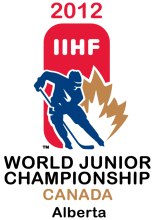In the post-Soviet era, the Russians have repeated as World Junior Champions just once (2003). What distinguished the big, talented 2003 team that beat the hosts 3-2 for gold in Halifax, Canada? And what does its fate portend for this year’s Team Russia, seeking a second straight title?
First and foremost, the ‘03 Russians benefited from a slew of key returning players – seven 19-year-olds in total. It was no coincidence that the four leading point-getters on coach Rafael Ishmatov’s squad had all played for the ‘02 team that rallied to defeat Canada 5-4 in the final on Anton Volchenkov’s third-period goal.
Those four included Igor Grigorenko (10 points), Yuri Trubachev (10 points), Alexander Perezhogin (9 points), and Alexander Polushin (8 points).
The fearsome quartet also saved their best for last, with Grigorenko and Perezhogin both earning two points and Trubachev and Polushin adding single points in the final versus Canada.
On top of that, the defence was anchored by two returnees and future 2010 Olympians in Fyodor Tyutin and Denis Grebeshkov (who recorded a team-leading +11). The effective if portly Andrei Medvedev got the job done in goal for the second consecutive year, recording a 1.80 GAA and .916 save percentage in his five starts.
This year, returning Russian head coach Valeri Bragin will enjoy no such luxuries when it comes to experience. This is what hurts Russia’s chances of repeating the most.
In fact, Bragin will have to make do with just one player from Buffalo 2011: third-year Traktor Chelyabinsk forward Yevgeni Kuznetsov. That’s a big plus – despite being the youngest player at 18 on last year’s squad, Kuznetsov elevated his game in the final, finished second in tournament scoring with 11 points, and was named a tournament all-star.
But as Canada found out with Eric Lindros in 1992 (finishing sixth in Füssen, Germany), you’re unlikely to win at this tournament when one player becomes the undisputed focal point of your team. So the Russians must get some support for Kuznetsov and his Yevgeni-Malkin-in-the-making routine.
The 2012 Russians may have something in common with their ‘03 predecessors: the presence of a projected #1 overall NHL draft pick on their roster. In Halifax, everyone knew that Alexander Ovechkin was destined for greatness. Wearing a full cage as a 17-year-old, Moscow’s most enthusiastic sniper popped in six goals in six games, and while he didn’t get a point on Trubachev’s tournament-winner, he took out two Canadian defenders on the play. The Washington Capitals made Ovechkin the top pick in the 2004 NHL draft.
Looking ahead to June 2012, Russia’s Nail Yakupov is widely considered the likely #1 overall pick. With his explosive offensive style, the 18-year-old whiz kid has been compared to everyone from Pavel Bure to Rick Nash. The question is whether Yakupov will be ready to perform at 100 percent during the 2012 World Juniors. A top-10 scorer in his sophomore season with the OHL’s Sarnia Sting, he hurt his back on an illegal hit by Garrett Ross of the Saginaw Spirit on November 18.
And if someone else is chosen first at Pittsburgh’s Consol Energy Center on June 22, it might be another Russian, Mikhail Grigorenko. With a goal and two assists, the tall 17-year-old Quebec Remparts centre was named the second star in Game Two of the annual Subway Super Series last month, where a touring Russian junior squad beat Team QMJHL 5-4 in a shootout. “I know one thing: we’re going to lose a centre,” said Remparts coach and Hockey Hall of Famer Patrick Roy recently, contending that Grigorenko definitely deserves a spot on Team Russia.
Coming to Canada to play major junior hasn’t historically been the road to elite success for Russians. However, Roy had the biggest exception to that rule in his lineup when Quebec won the 2006 Memorial Cup: Alexander Radulov. So perhaps either Grigorenko or Yakupov will be able to make a bigger-than-average dent at this tournament for kids who aren’t yet 19.
There is, of course, no single recipe for success at the World Juniors, regardless of what can be learned from the 2003 campaign.
For instance, you’d expect the Russians to bring a high-octane power play, but that wasn’t the case when they last repeated in 2003. In fact, they were feeble with the man advantage, scoring three goals for a 12.5 percent conversion rate, contrasting with Canada’s 14 goals and 37.8 percent efficiency. They’ll want to bring a much better PP in 2012.
Last year’s gold medal-winning team had an amazing ability to prevail in the clutch, beating Finland 4-3 in overtime in the quarter-finals, edging Sweden 4-3 in a semi-final shootout, and potting five third-period goals to stun Canada 5-3 in the final. But that’s atypical: historically, Russian teams do better as front-runners.
This year, how will the young Russians handle the huge, boisterous crowds at the Calgary Saddledome? That remains to be seen.
Russia has faced Canada in the gold medal game in three out of the five occasions that Canada has hosted the tournament since the IIHF adopted the playoff format in 1996. The Russians won in 1999 and 2003, but got thumped 5-0 in Vancouver in 2006. Of course, the US-hosted tournament in 2005 (Grand Forks) and 2011 (Buffalo) were also essentially home finals for Canada, with partisan red-and-white throngs on hand, and the two archrivals won one apiece, Canada prevailing 6-1 in ‘05.
Consistency is what post-Soviet Russian national teams at all levels have struggled to deliver, the exception being coach Slava Bykov’s run of four consecutive senior World Championship medals between 2007 and 2010. If this year’s U20 crop can bear down, ignore the hype associated with playing in the most avidly watched and attended World Junior tournament yet, and put together some solid 60-minute efforts (how Canadian-sounding!), that might be the recipe for a Russian repeat right there.
LUCAS AYKROYD
|
 |
 |







